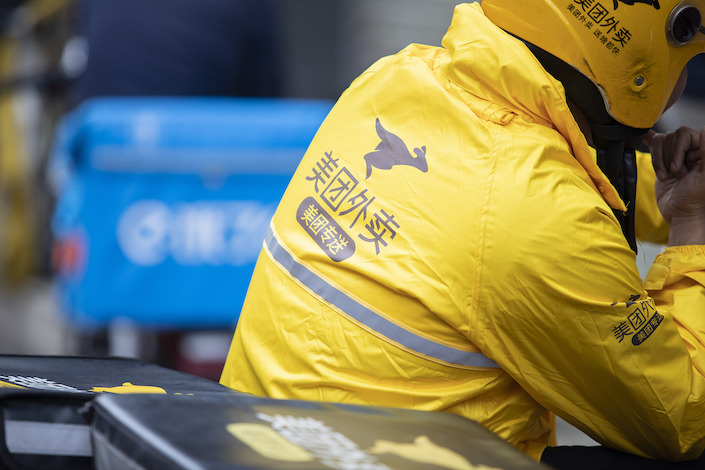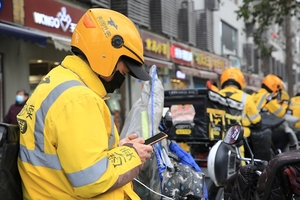Meituan Shares Plunge 14% as New Regulations Threaten Higher Costs

Meituan’s Hong Kong-traded shares plummeted 14% Monday, the biggest drop on record, after the Chinese food delivery giant was ordered to pay social insurance for delivery drivers, threatening to significantly drive up costs.
The Chinese government ordered that online food delivery platforms not set evaluation criteria based on optimization algorithms, respect the rights of delivery drivers and ensure that workers earn at least the local minimum income with social insurance. The sweeping set of guidelines was issued Monday by seven government agencies including the powerful State Administration for Market Regulation (SAMR) and the Ministry of Human Resources and Social Security.
Labor abuse by online food delivery platforms came into the spotlight in April after a government official disguised as a Meituan driver working a 12-hour shift featured in a television program in Beijing. After earning 41 yuan ($6.32) a day, Wang Lin, a deputy director at Beijing’s Bureau of Human Resources and Social Security, said the experience left him feeling “humiliated” as he sat exhausted on the curb at 9 p.m. “This money is just too hard to earn,” he said to the camera.
For one delivery, Wang was meant to arrive in 14 minutes, but his navigation system told him it would take 24 minutes, leaving the food cold. Another trip took the temporary driver an hour but netted him 6.6 yuan after Meituan fined him 60% of the fee for taking too long.
In January, a food deliveryman for Alibaba-owned takeout platform Ele.me set himself on fire outside a shop in the eastern Chinese city of Taizhou over a pay dispute, highlighting the difficult work conditions faced by millions of temporary employees in the online platform sector.
The new guidelines lay out 19 measures to safeguard the rights and interests of flexibly employed delivery workers, including improving the income distribution mechanism and relaxing delivery deadlines. Platforms and third-party labor service partners were told to provide social insurance and accident insurance for drivers, promote trade unions and establish a direct complaint channel for workers.
The guidelines require platforms and labor service partners to provide social insurance only for drivers who have established employment relations with them, but it was unclear how platforms and third parties will determine whether there are employment relations with drivers.
Hao Zhengxin, a lawyer who has long provided legal advice for temporary workers, said it is difficult to establish a formal labor relationship between part-time delivery workers and the platforms they work for. If a delivery worker is injured on the job, the platform basically takes no responsibility, and for full-time delivery workers, only some end up getting labor relationships clarified legally in such a way that compels the platforms to take responsibility, he said.
Meituan, with 9.5 million delivery drivers, has been criticized for using optimization algorithms to push drivers to the brink, forcing them to zip around streets and alleys on electric bikes at hair-raising speeds, breaking traffic rules to meet tight deadlines and avoid being penalized.
The government’s new rules will pose a significant challenge for the delivery platforms’ business structures. Drivers are the single largest cost and the biggest source of risk for online delivery companies. The model of employing temporary workers prevails among internet platforms in the shared economy as employers haven’t had to pay as much in social insurance costs. Although drivers can work longer and earn more under a model that pays them based on the number of deliveries they make, most don’t receive standard benefits such as health insurance and work-related injury insurance that formal employees receive.
There has been a debate over whether delivery platforms should treat drivers as full-time employees and pay their social security. Meituan founder and Chief Executive Officer Wang Xing said in May that the company will actively cooperate with the government to explore social security for part-time drivers, including commercial insurance and accident insurance.
Delivery workers’ salaries and incentives consume 73.5% of Meituan’s revenue. Without paying social insurance for drivers, the company spent 48.7 billion yuan on driver wages in 2020. If it has to pay social insurance for its 9.5 million drivers, the costs could rise significantly.
The growth rate of Meituan’s core food delivery business has slowed, and future potential for profit gains will mainly come from improving delivery efficiency by increasing deliveries during peak periods and increasing deliveries per driver, a Meituan insider told Caixin.
The requirements to relax delivery deadlines and reduce labor intensity will directly affect the efficiency of food delivery platforms. Excluding driver wages, the operating margin of Meituan’s food delivery business was only 0.38% in the first quarter, Chief Financial Officer Chen Shaohui said on the first-quarter earnings call.
Meituan also faces multiple challenges such as antitrust investigations and regulatory compliance in community group buying. In April, the SAMR launched an investigation of the company for suspected anticompetitive practices, including the policy known as “picking sides,” in which a platform forces merchants to work exclusively with it and shun competitors.
Meituan’s stock has tumbled almost 50% from its peak in February as the company grapples with regulatory scrutiny. Its shares closed at HK$235 ($30.22), down 13.76% from last Friday.
Contact reporter Denise Jia (huijuanjia@caixin.com) and editor Bob Simison (bobsimison@caixin.com)
Download our app to receive breaking news alerts and read the news on the go.
Get our weekly free Must-Read newsletter.

- PODCAST
- MOST POPULAR







 Sign in with Google
Sign in with Google
 Sign in with Facebook
Sign in with Facebook
 Sign in with 财新
Sign in with 财新